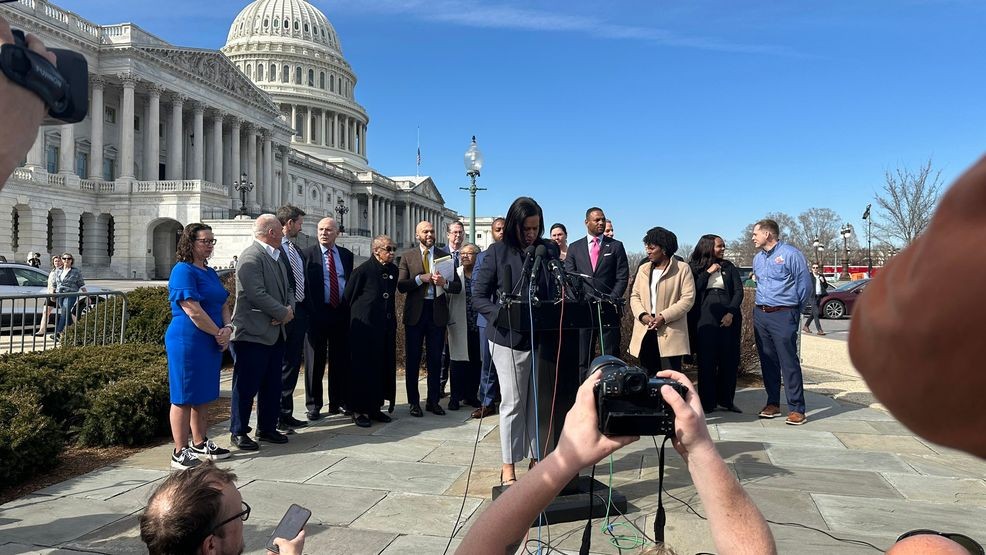Read Full Article | View Source

WASHINGTON (7News) — D.C. leaders and public safety advocates are closely watching the U.S. House of Representatives, as they are considering a bill that restores more than $1 billion to the city’s budget that was cut in the spending bill Congress had to approve to avert a government shutdown.
Ahead of the vote on the spending bill, city leaders went to Capitol Hill multiple times this week to talk lawmakers into getting rid of the measure that cuts D.C.’s spending.
Mayor Muriel Bowser and others warned this could lead to tens of millions of dollars being cut from key public safety and education services, including almost $4 million from D.C.’s Office of Unified Communications (OUC), which runs the 911 call center.
Dave Statter, who is a public safety advocate and a long-time watchdog of OUC, told 7News this cut could kneecap an agency that has already been hobbling —in the eyes of critics— for the past year.
“With this bill, essentially what is happening is they’re defunding the police, fire, EMS, and 911 and other important agencies that make the difference between life and death in the city,” Statter said. “It’s probably somewhere near a 5 % cut in their operating budget. “They’re already having problems filling positions. They’ve apparently done better in hiring more people. I’d hate there to be a setback. Having effective leadership has been the big problem in OUC, but if you cut 3-to-5 % of their budget, that’s not a good sign for OUC.”
The 7News I-Team has reported at least eight technical incidents with the 911 call center since May 2024, which is less than a year ago.
Just this past week, as lawmakers debated the spending bill that included the cut to the nation’s capital, there were two concerning incidents at OUC.
Last Sunday, there were a number of calls that went unanswered by dispatch over a five-minute period.
Just days later, on Wednesday, OUC reported a 12-minute interference issue that resulted from a faulty antenna located in a different building in the city.
The agency released the following statement for the Wednesday incident:
Earlier today (Wednesday, March 12, 2025), the Office of Unified Communications (OUC) shared information related to an unauthorized remote user that caused interference with OUC’s radio system relied on by the Metropolitan Police Department (MPD). The incident investigation, conducted by OUC and the Federal Communications Commission, has concluded. There was no malice associated with the incident as it was caused by a faulty bi-directional antenna located in a building within the District. Installers are working to correct the issue. This morning, the radio system was impacted for approximately 12 minutes and there was no total loss of service. Property owners and managers should familiarize themselves with bi-directional antenna requirements for the District of Columbia.
Statter said he worries issues at OUC will only get worse if the cuts to the city’s budget remain.
“Taking this money away will make it worse. It will impact 911. They won’t have the money to hire people, probably. They likely won’t have to money for all of the overtime that’s necessary to keep those seats filled 24/7,” Statter said. “If you don’t have the money for training, if you don’t have the money to have people answer the phones promptly, people will get delayed calls, they’ll get people who aren’t trained well enough. They already have that problem.”
City leaders and Statter may have suffered some whiplash Friday night.
That night, the Senate approved the spending bill as-is, keeping the D.C. budget cut in.
However, immediately after, Sen. Susan Collins, R-Maine, introduced a standalone bill to undo the funding cut from the spending bill.
“This bill would simply fix a mistake in the House CR that prevents the District of Columbia from spending its own tax dollars as part of its budget, which Congress routinely approves,” Collins said. “As a result, unless this bill is passed, D.C. would have to operate under its fiscal year ’24 budget for the remainder of 25, potentially requiring $1.1 billion in local spending cuts. Reducing D.C.’s local funding expenditures will not result in a dollar of federal savings.”
The Senate passed the bill to restore D.C.’s funding, and it now awaits a vote in the House.
Collins said the bill has been endorsed by President Donald Trump and U.S. Rep. Tom Cole, R-Okla., who is the chairman of the House Committee on Appropriations.
Until the House approves the standalone bill, the District is still technically short more than $1 billion from the budget with only half of the fiscal year left to go.
7News On Your Side asked OUC how any cuts to the agency could affect service. A spokesperson deferred to Mayor Bowser’s office.
A spokesperson from the mayor’s office provided a statement saying, “We remain hopeful that our partners in Congress will get it fixed this week. We sent a balanced budget to Congress last year, they approved it, and we have been operating under this budget for nearly six months.”
7News On Your Side also reached out to the D.C. Office of the Chief Financial Officer, asking the following questions:
- Until the standalone bill fully passes, is your office preparing what cuts and/or layoffs to make?
- Have cuts or layoffs already been made?
- If the standalone bill does not pass, how soon will your office begin funding cuts and layoffs?
A spokesperson provided the following statement in response:
There is no need to take immediate action. However, we are prepared to work with the Mayor and Council to take the necessary steps if the final bill is not approved.
The House is scheduled to reconvene on the floor on Tuesday.
Until then, there may be a great deal of breath-holding across the District.
“The people who are going to suffer when they take money away from OUC is the public. Ultimately, they’re the ones who hurt when 911 isn’t operating properly,” Statter said. “And it also impacts the people who perform public safety out in the field: police, firefighters, EMTs. 911 is also their life safety line, and if they don’t have the people in the seats – the dispatchers, particularly, right now they’re very shorthanded – they’re not going to get the help they need when they’re in an emergency.”


